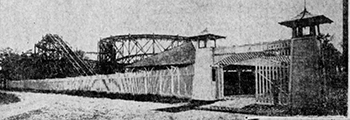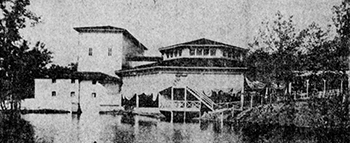The Elbert Files: Ingersoll Park

Top: The entrance to Ingersoll Park, which was located east of Polk Boulevard between Grand and Ingersoll avenues.
Bottom: The Ingersoll Park Theater in 1907.
“Coney Island of the West” is what Des Moines’ Ingersoll Park was called more than 100 years ago.
It featured the city’s first roller coaster, a merry-go-round, three elephants and a bandstand where French stage actress Sarah Bernhardt once performed and President Theodore Roosevelt spoke in 1903.
The three-block-long venue covered 7 acres of rolling topography, east of Polk Boulevard between Grand and Ingersoll avenues, across from what is now the Des Moines Art Center.
The park was operated by the Des Moines Street Railway Co., which, like trolley lines across the country, sponsored entertainment sites to boost ridership.
During the mid-1890s the streetcar company had sponsored “garden theater” and “moving picture shows” in city parks, according to a 1907 newspaper article. When park officials objected, the trolley line leased the Ingersoll site and opened a full-scale amusement park in 1901.
They had some idea of what to expect because some years earlier the Iowa State Fair had operated nearby on 60 acres north of Grand Avenue and east of 42nd Street. Rail passenger cars connecting the fair with downtown were hugely profitable between 1878 and 1886.
During the 12 years the Ingersoll Park operated, the Ingersoll trolley was the most popular ride in town, attracting visitors of all ages and both sexes, unlike a companion route that delivered mostly male riders to the then-new Waveland Park Golf Course.
The Des Moines Register predicted in 1907 that 30,000 people would attend Ingersoll Park on opening day and that “fully 250,000 people will have thronged through the gates” by the end of the 16-week season.
“No summer garden in America has flourished so steadily and maintained such a high standard as Ingersoll Park,” the Register reported.
Col. Fred Buchanan, the circus promoter who managed the park, said the key to success was that “Ingersoll Park is practically the only summer theater garden in America where beer is not sold. … Never a drop of liquor, never an undesirable character allowed in the park.”
“Women can come out with the knowledge that they will be safe,” he said.
Buchannan was an early version of Jeff Chelsvig, the highly regarded manager of Des Moines Performing Arts whose genius over the past 27 years has attracted Broadway shows to Des Moines years before they appear in much larger cities.
The 1907 article explained that Ingersoll Park’s theatrical attractions had grown after launching with an open-air stage “of limited space and accommodation, lighted by poles bearing pans on which red-lights were replenished every little while,” with “spectators seated on common wooden chairs in the main part of the house [and] on park benches in the rear.”
The original stage, it said, was only 4 feet deep and “a vocal quartette bowing its thanks to the enthusiastic applause backed off” and fell into the adjacent lake.
In succeeding years, the stage was widened and lengthened, and seating was expanded to 3,200. Eventually the entire theater was enclosed, eliminating the need to cancel shows when it rained.
New rides were also added, including a crazy house, “Tour of the World,” circle swing and magnetic house.
“The largest crowd ever accommodated at one time in the park was on the Sunday afternoon when Hagenbeck’s elephants were given a bath in the park lake and 44,000 people crowded inside the enclosure,” the 1907 newspaper article reported.
The park closed after its land lease expired in 1912, which was just as well because by then housing was encroaching and neighbors were complaining about noise from the carnival rides.
A few years later, Riverview Park opened in 1915 near the Des Moines River on the Highland Park trolley line. Riverview’s popularity extended across six decades, with the park closing only after Adventureland Park opened in 1975 in Altoona on a site where Des Moines’ first airport had operated during the 1920s.








